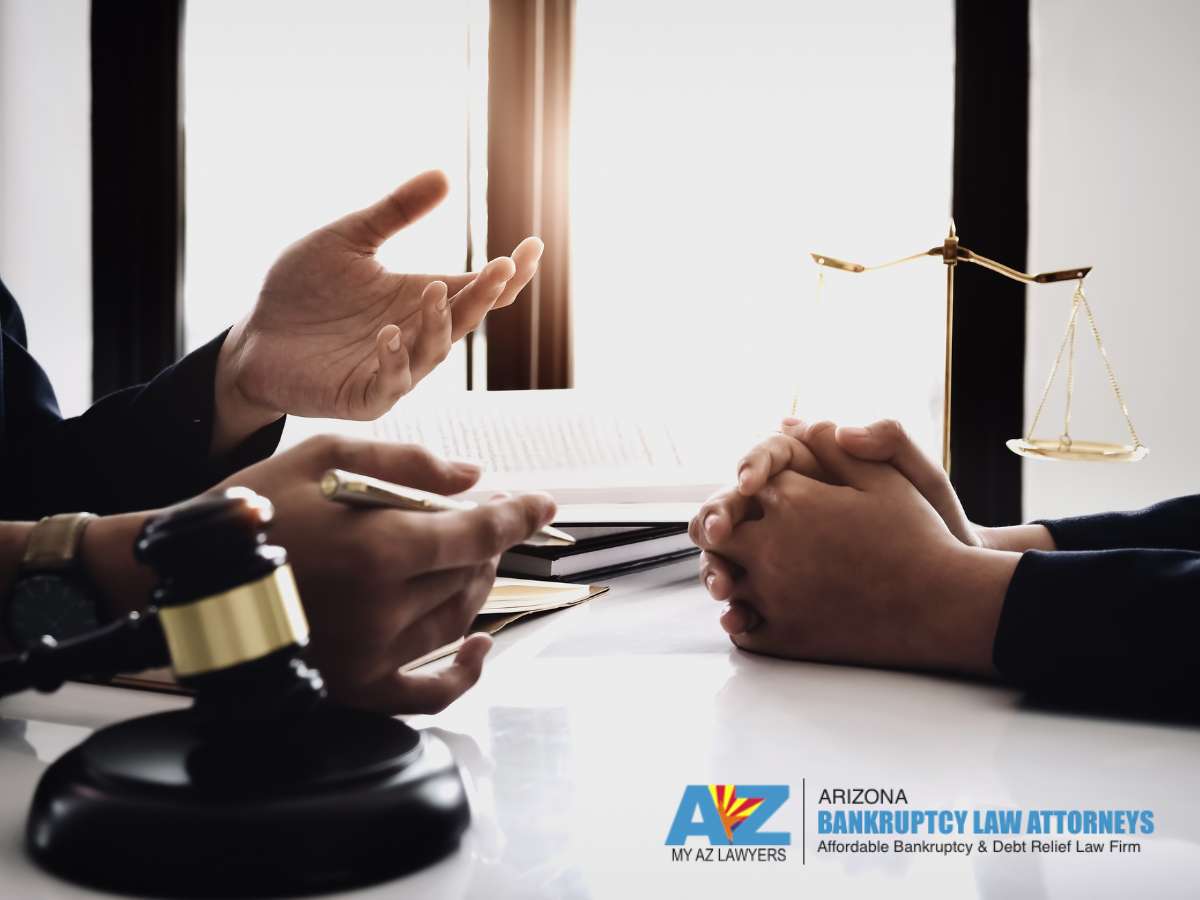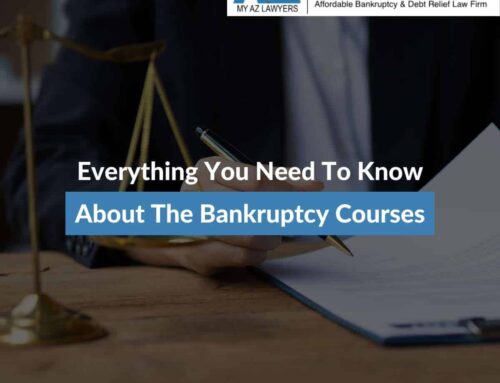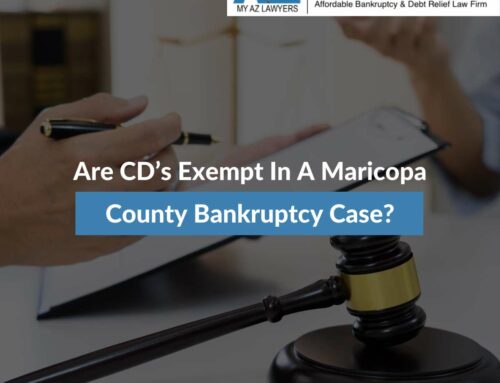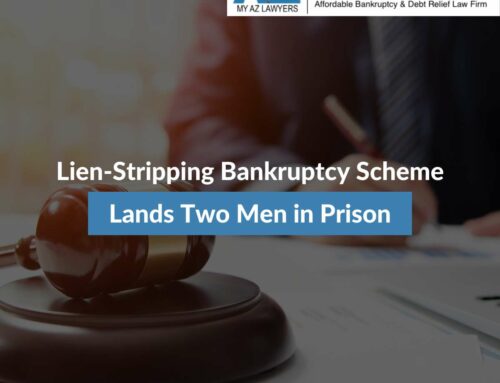Coping with the Emotional Side Effects of Declaring Bankruptcy
The road to bankruptcy usually is not particularly enjoyable, or at least up to the point where the debtor starts preparing to file. Someone struggling with debt is probably pretty stressed, and may even be forgoing their own needs to keep creditors at bay. There is also a stigma that society attaches to declaring bankruptcy. Although many successful people have ended up in bankruptcy court, including more than one of our presidents, there are still misconceptions about people who file for bankruptcy. Bankruptcy also isn’t a guarantee that the debtor will live comfortably after discharging debts. Read on to learn more about the emotional impact of filing for bankruptcy, and what a bankruptcy debtor can do to reduce that impact. For your free consultation with one of our experienced bankruptcy lawyers, click here or call 480-448-9800.

How Does Filing for Bankruptcy Affect a Debtor Emotionally?
Most people are aware of some of the effects and benefits that filing for bankruptcy offers. Creditors must stop harassing a debtor who retains a bankruptcy attorney, and filing a petition triggers the automatic stay. When the automatic stay is in place, creditors can’t sue the debtor, garnish their wages, repossess their assets, etc. This can take pressure off the debtor, but most won’t feel completely at ease during a pending bankruptcy, either. Some cases will proceed exactly according to plan. Other debtors might experience obstacles like trustee inquiries, adversary proceedings, etc. Here, true relief won’t come until the case has been successfully discharged. A bankruptcy debtor may also feel disappointment and shame over ending up in bankruptcy. There also may be worry about the debtor’s odds of approval on financial applications in the future. If you’re looking for a skilled bankruptcy lawyer to ease the burden during your case, call 480-448-9800 to schedule your free consultation with our firm.
Filing for Bankruptcy in Arizona: The Mental & Emotional Side Effects
In Arizona, as in any other state, filing for bankruptcy can have significant mental and emotional side effects on individuals and their families. It’s essential to be aware of these potential consequences:
- Stress and Anxiety: The process of filing for bankruptcy can be overwhelming and stressful. The anticipation of facing financial difficulties, meeting with creditors, and navigating complex legal procedures can lead to heightened anxiety levels.
- Depression: Financial problems and the prospect of bankruptcy can trigger or exacerbate symptoms of depression. Feelings of hopelessness, shame, and guilt may arise as individuals grapple with their financial situation.
- Grief and Loss: Filing for bankruptcy often involves losing assets, such as a home or a car. Coping with the loss of these possessions can evoke grief and sadness.
- Shame and Stigma: Bankruptcy in Arizona can carry a social stigma, and individuals may feel embarrassed or ashamed about their financial situation. This sense of shame can lead to social isolation and strained relationships.
- Low Self-Esteem: Financial difficulties and bankruptcy can erode self-esteem and self-worth. People may feel like they have failed or made poor financial decisions, leading to a diminished sense of self.
- Anger and Frustration: Individuals may experience anger and frustration, especially if they believe external factors or predatory lending practices cause their financial troubles.
- Marital and Family Strain: Financial stress is a common source of conflict in relationships and families. The strain caused by bankruptcy can lead to increased tensions, arguments, and even the breakdown of relationships.
- Loss of Control: Filing for bankruptcy can make individuals feel like they have lost control over their financial lives. This loss of control can contribute to feelings of helplessness and insecurity.
- Fear of the Future: Bankruptcy can create uncertainty about the future, including concerns about rebuilding credit, finding stable housing, and securing employment. Fear of ongoing financial instability can be emotionally draining.
- Impact on Mental Health: The mental and emotional side effects of bankruptcy can have a cascading effect on overall mental health. Untreated mental health issues can further complicate the process of recovery.
Navigating Emotional Challenges: Coping Methods for Bankruptcy
Here are some methods of coping with the mental and emotional challenges of bankruptcy in Arizona:
- Seek Professional Help: Consult a mental health professional.
- Legal Guidance: Work closely with experienced bankruptcy attorneys.
- Support Network: Lean on friends and family for support.
- Financial Counseling: Improve financial literacy and plan for the future.
- Self-Care: Practice self-care strategies to manage emotional distress.
- Support Groups: Join groups for individuals who have gone through bankruptcy.
Remember, bankruptcy is a legal process designed to provide individuals with a fresh start when facing overwhelming debt. While emotionally taxing, it is a tool to help regain financial stability and move forward.
DABDA & Bankruptcy
DABDA is one of the most common illustrations of the grief process. It stands for Denial, Anger, Bargaining, Depression, and Acceptance. These five steps can all be applied to emotions a debtor may feel during the bankruptcy process. A pre-bankruptcy debtor may be in denial about their spending practices or debt-to-income ratio. Many debtors ignore calls and letters from creditors until a lawsuit is filed against them. Even if bankruptcy is brought on by an emergency, it may take a while for a debtor to stop denying that bankruptcy is necessary.
The first “A” in DABDA is anger. The circumstances leading up to bankruptcy may be simply unfair. An unexpected medical event could cause you physical pain, keep you away from your employment and interests, and then burden you with entirely unrealistic bills. Another leading cause of bankruptcy is divorce, which usually leaves both spouses with a lot of anger.
Bargaining can be represented when a bankruptcy debtor tries out other methods of debt relief before eventually filing for bankruptcy. Common examples include debt consolidation and debt settlement. These forms of debt relief can be effective for some but don’t offer as powerful benefits as bankruptcy does. That means the debtor can end up wasting time and money paying for debt relief when they will end up declaring bankruptcy anyway.
Depression can occur at any stage in the bankruptcy process. It can also be difficult to differentiate it from other emotions felt during bankruptcy. The good thing is that it is the last stage in DABDA before acceptance. Debtors who reached this phase have forgiven themselves for the circumstances leading to their bankruptcy and feel confident about what they must do moving forward to build a better financial future.
Post-Bankruptcy Stressors
Getting your case filed is stressful enough, but there are unique experiences that won’t happen until after your debts have been discharged. These can be surprising since you might think your troubles are over once your case is complete. But you need to factor in these potential stressors before you file because it will be too late to go back once your case is filed and later discharged.
- Disqualification from most types of home mortgages for 2 years
- Bankruptcy remaining on your credit report- Chapter 7 lasts ten years and Chapter 13 lasts seven years
- Needing to choose new credit cards from the several offers you receive after discharge
- Checking your credit report to confirm that pre-bankruptcy debts are cleared
- Explaining a bankruptcy filing to potential employers in the financial industry, cosigners on loans, and other affected parties, etc.
- Adjusting to life without any assets that may have needed to be surrendered as part of the bankruptcy
Moving On After Bankruptcy
Your attitude towards your bankruptcy can set the tone for your emotions going forward. Bankruptcy is meant to help someone struggling with debt out of a tough spot, but it can also be a learning experience and an opportunity to create a new future with better financial habits. Every bankruptcy debtor is required to complete two credit counseling courses. These courses take 1-2 hours each and will usually be completed online and from the comfort of your own home. The first course should be taken before filing so the completion certificate can be attached to the bankruptcy petition. The second course must be completed no more than 60 days after the 341 Meeting of Creditors. These courses offer helpful budgeting tips for your life after bankruptcy. Take them in so you can avoid unmanageable debt after bankruptcy, especially because you will be disqualified from discharging debts in bankruptcy again for many years after your case is completed. For more information about bankruptcy waiting periods and tips to rebuild credit after bankruptcy, call 480-448-9800 to schedule your free consultation.
You may be made to feel embarrassed or like a failure for ending up in bankruptcy court. But it’s important to have compassion for yourself in all areas of life, including financially. Filing for bankruptcy could have been entirely out of your control, or due to mistakes that are only human to make. There are countless examples across the history of people and businesses who have been massively successful after filing for bankruptcy. With the right attitude, you could become one of them. Of course, if you are struggling with your mental health due to bankruptcy, minding your attitude probably won’t be sufficient to treat your symptoms. Talk to a mental health professional if depression and other issues arise or persist.
Make the Bankruptcy Process Easier By Hiring a Reputable Law Firm
If bankruptcy takes a toll on your mental health, it will only be made worse if mistakes in your filing cause delays, objections, extra hearings, and other problems that arise for self-represented debtors. Skilled representation can get you on the right track toward rebuilding credit. This can help alleviate the emotional pain you might feel as a result of filing for bankruptcy. At Arizona Bankruptcy Law Attorneys, we will make your case easier and clearer from start to finish. Don’t let legal errors tie up your case and make it even more stressful. Contact us through our online form to get started with your free consultation with our firm or call us at 480-448-9800.
Mesa Bankruptcy Law Office
Mesa Bankruptcy Lawyers
4065 E University Dr #500
Mesa, AZ 85205
(480) 470-0005
Phoenix Bankruptcy Law Office
668 North 44th Street, Suite #300
Phoenix, AZ 85008
(480) 833-8000
Glendale Bankruptcy Law Office
My AZ Lawyers
20325 N. 51st Ave.
Suite #134
Glendale, AZ 85308
(623) 640-4945
Tucson Bankruptcy Law Office
My AZ Lawyers
2 East Congress St. Ste. 900
Tucson, AZ 85701
(520) 306-8729
Avondale Bankruptcy Law Office
My AZ Lawyers
12725 W. Indian School Rd.Suite E, #101
Avondale, AZ 85392
(623) 399-4222
Additional Information at:
Phoenix Bankruptcy Lawyer
Mesa Bankruptcy Lawyers
Phoenix DUI Lawyer
Chandler Bankruptcy Lawyer
Tempe Bankruptcy Lawyers
Vegas Zero Down Bankruptcy Attorney
Gilbert Bankruptcy Lawyers
Tucson Bankruptcy Lawyer
Arizona Zero Down DUI
Las Vegas Bankruptcy Lawyers
AZ Bankruptcy Lawyer






